#archetype inspirations
Text
The privilege of a lifetime is to become who you truly are
- Carl Jung
#shadow self#beautiful quote#shadow work#individuation#jungian psychology#psychology quotes#psychology#jungian shadow#carl jung#jung#jungian archetypes#philosophy quotes#philosophy#witchblr#archetypes#shadow work quotes#inspiring quotes
713 notes
·
View notes
Text
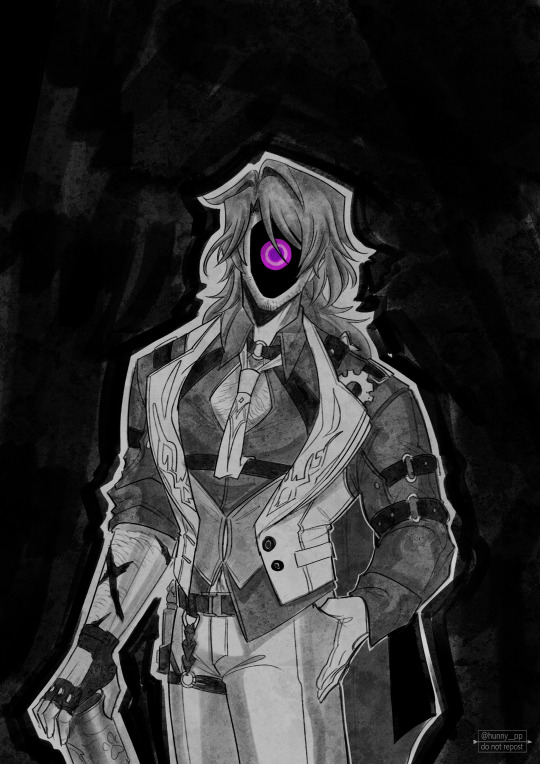
most normal security officer.
#honkai star rail#hsr gallagher#gallagher#hsr spoilers#eye horror#body horror#digital art#dollhouse's art#love when a char genuinely inspires me#when they make the dilf archetype a cosmic horror AUGH they know how to keep me
204 notes
·
View notes
Text
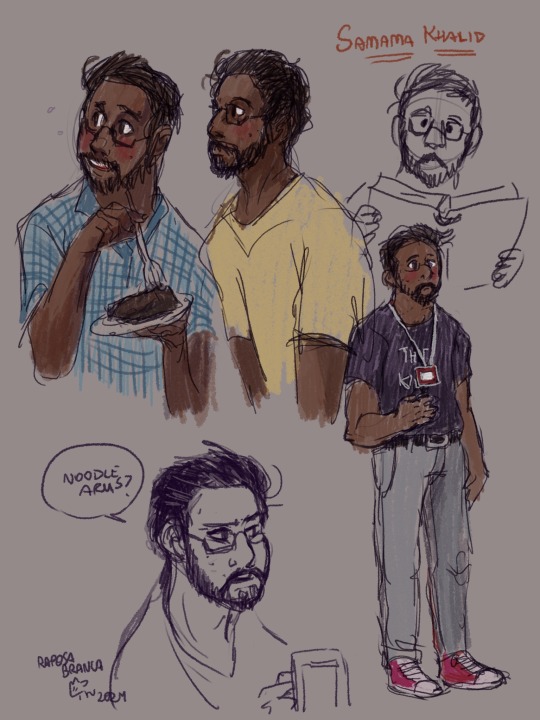
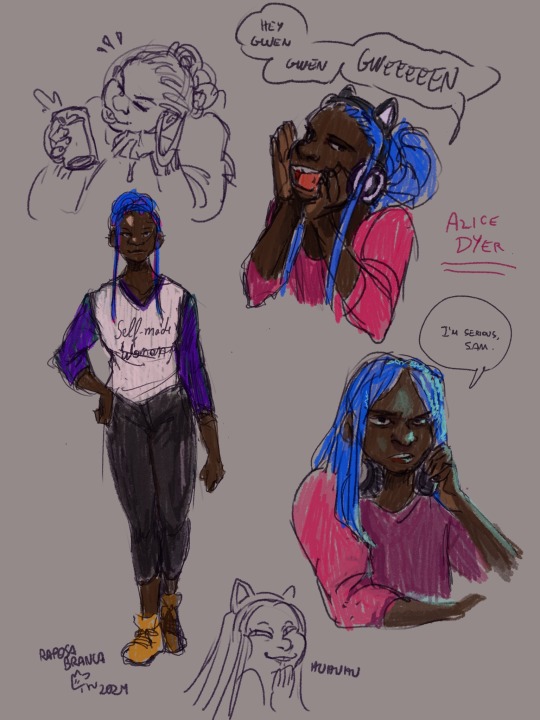
I already love my new children.
#tmagp#tmp#samama khalid#alice dyer#design notes:#sam is inspired in 50% of all male indian students i see around campus#(affectionate)#he has rosacea and isn't mega thin#but is soft. like noodles#alice is inspired by a wonderful picture of a wonan i found in pinterest#and by Sher Machado (Transcurecer) a brazilian transfem pro gamer#and also that fox archetype in japanese lore#raposabranca
303 notes
·
View notes
Text
The idea of the twelve character archetypes was suggested by the Swiss psychiatrist Carl Jung. His theory on basic human personalities suggests that each human is led predominantly by one of four motivations during their lifespan, split into three separate character traits. These archetypes are now often used by writers as a basis for their characters.
The "Provide Structure" trait includes:
The Caregiver
The Creator
The Ruler
The "Spiritual Journey" trait includes:
The Innocent
The Explorer
The Sage
The "Leave a Mark" trait includes:
The Hero
The Outlaw
The Magician
The "Connect With Others" trait includes:
The Everyman
The Lover
The Jester
#writers#creative writing#writing#writing community#writers of tumblr#creative writers#writing inspiration#writeblr#writerblr#writing tips#writblr#quick writing tips#writing help#writing resources#writing advice#writing tips and tricks#character development#character archetypes#writing characters#writing reference#advice for writers#learn to write#help for writers#helping writers#let's write
777 notes
·
View notes
Text
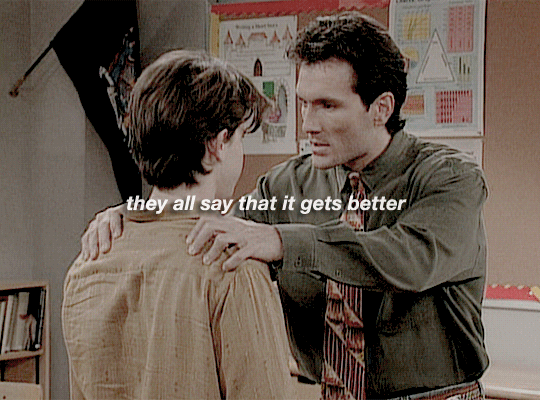
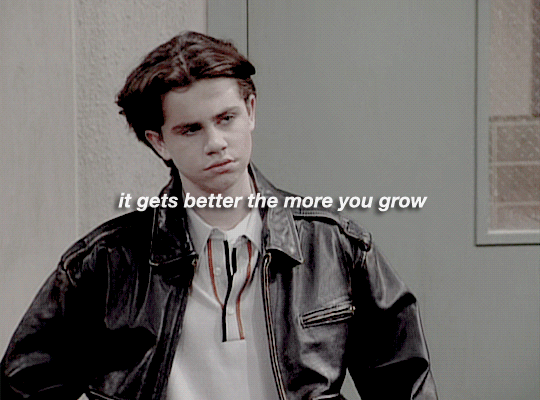

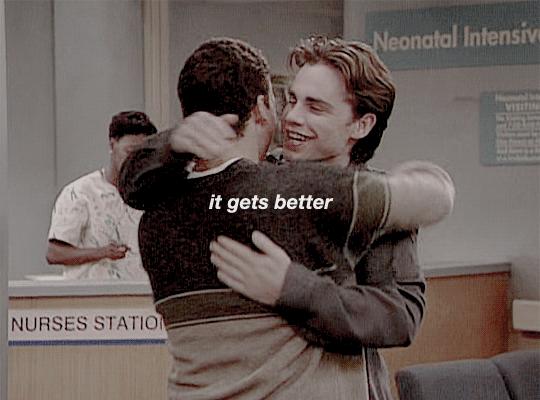
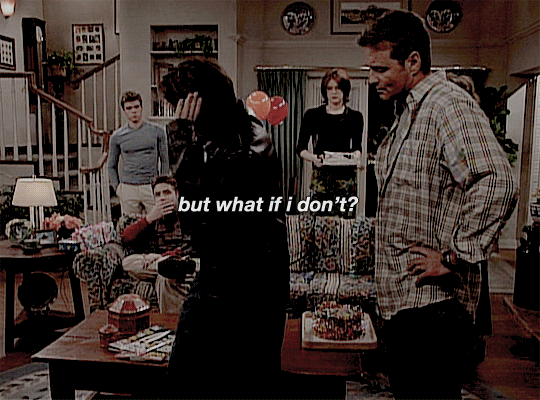
i'm sorry that i couldn't always be your teenage dream
#bmwedit#boy meets world#shawn hunter#*#gifs: bmw#immediate first thought upon first listen was 'this is shawn's song'#reminder that any troubled bad boy archetype to come after like 1996 is inspired by shawn#unless they're a POS then no they weren't <3#i just love this boy w all my heart and everything in me#LESS THAN ONE MONTH UNTIL I HUG RIDER AND GIVE HIM MY LETTER
171 notes
·
View notes
Text
I’m gonna try to say this without sounding weird… okay?
Another reason why I like Barbatos so much as an Archon is that he is the type of god I would want for me.
He’s so human-like that it’s easy to forget he’s a god. He actively interacts with humans regularly to understand their culture, and he encourages “rest” and “joy” in life through a strong drinking culture and “whimsical” lifestyle.
It really is about finding joy in an everyday life.
Not only that, but he actively participates in putting on events to further this motto, most recent case scenario: The Poetry Event!
It’s these small things that he partakes in that encourages his people to grow and learn new things/try new things while—most importantly—having fun (!) that portray a god that is FOR the people first and foremost. Remembering that even though it’s simple (ish. Poetry is hard, sometimes, to me LOL), it is something new and exciting and breaks that monotonous life cycle.
He’s also a god that doesn’t “hover”; he’s there if you really need him but, otherwise, you have to fight your own battles. You need to grow; you need to realize your own strength by not having him around all the time.
Sure, he pokes fun at himself in these instances, sleeps so often that he really isn’t there all the time, is a drinker, etc., that it’s almost hard to see him as a god at all. He is so human.
You’re only reminded he’s a god when you realize he’s had a whole life, and several lives, really, before this one.
So, perhaps the reason he’s so appealing as a god is because he doesn’t really act like one at all. He acts like a “good” and humble human.
I suppose those that you find similarities in are what attracts you, so maybe that plays a part in Venti’s appeal. (Aka his human similarities)
On the other hand, Zhongli is probably best in encompassing the picture of a god: strong, capable, ready to step in but also ready to test his people “if they’re worthy” of standing on their own.
Ei is… a god in the sense that she’s feared. Untouchable. Hard to see any likeness in her to a human, so, she is, indeed, separate from her people.
Nahida holds knowledge so unfathomable and intangible that she is otherworldly, but due to her age, she is hard to compare to an “otherworldly god” and more seems like “another power”/“oracle”/“great other being” to seek out advice but to never quite “worship”—or at least, that’s what the Archon quest felt like to me.
Focalors is… well, she is painted to be the one imitating a god—down to the dotted ‘i’ where she puts on a bravado with none of the power to back it up. By all means, she should be the feared god, the powerful and interesting one that has an iron hand and all-wisdom—as if she plays both Nahida and Zhongli at once—but her power is that of a Venti, an everyday man that speaks ostentatious language to intimidate but never follows up on his word—for now. She’s just getting started, after all.
(Note: haven’t played the continuance of the Archon Quest at this time)
I guess it depends on how you define a god, which is why these portrayals are all so unique. It would then also depend on each individual to pick which one is the most appealing god to you—a protector, one with wisdom, a feared god, one that is active and fascinating, or—the one that blends in with its people.
#this was inspired by someone saying ‘Venti is a god I’d worship’#and while I felt weird putting it that way#there is something so appealing about Mondstadt and its god (Venti bias here) that made me to love this region and archon the most#my type is the ‘gentle god’ archetype#also short men.#anyway#venti#zhongli#nahida#focalors#furina#it’ll take me a minute to switch over to her name#genshin impact#genshin archons#my rambles or something#truly these are just rambles#aka if I was iseki’d into genshin
116 notes
·
View notes
Text
I don’t usually make posts like this, but I’ve been seeing a lot of anti-intellectual junk lately, and I really think we need to put the word “pretentious” up on a shelf until people learn what it actually means.
It doesn’t describe someone who likes artsy-fartsy deep meaning media. People who are pretentious are fake. They’re posers trying to be sophisticated and unique, not like other girls. They pretend to only like stuff they think will make them sound cool when they talk about it. They want to act like they know something you don’t, and they want attention for it.
By definition, if you genuinely enjoy something, you can’t be pretentious. If it resonates with you, and you analyze it, and you don’t care what people think, that’s the polar opposite, actually. If you love obscure experimental prog music, if you watch underground high concept indie films through English teacher eyes, if you spend hours in a modern art museum reading each piece as a vessel for storytelling, if your backpack’s full of poetry books that inspire you, if you play underrated games that were someone’s passion project, if you have an interest in studying the classics or the masters, you are not pretentious.
Of course, some people just don’t like some stuff, and that’s fine, but that’s not what this is about. Don’t let anti-intellectuals shame you for enjoying things just because your interests are inaccessible to them, because they refuse to be brave and put effort into critical thinking. You’re not stuck up for refusing to overlook the craft of artists.
#anti intellectualism#media#movies#books#music#critical thinking#my friend who primarily listens to one very popular band once said that people who listen to obscure music are annoying and pretentious#which rubbed me the wrong way because 1 she knows that I listen to obscure music and 2 it’s such a cowardly consumerist take. anyone can#make music and hey a lot of the people who do make GOOD music. and this goes for all *obscure* media#this post was mostly inspired by people talking about Barbie and those anti pick me girls like the pick nobody girls who insist thinking is#for boys and having fun with an empty brain is for girls. Greta gerwig is an artist. I haven’t seen the movie yet but I know it has a deeper#message than haha cute pink! I’ve seen the summaries about the true meaning. the pinkness and popularity doesn’t negate the narritive.#though in the notes I saw a lot of tumblristas comunistas shitting on the film for being one big ad that people *fell for* which tbh is#tbh almost as anti-intellectual. don’t get me wrong they milked this film to sell hella shit but I don’t believe kids who play with dolls#are the target audience as these people claim. Barbie is a culturally iconic symbol almost archetypical of societal expectations for women#you say barbie people think unblinking perfect plastic pink girly. reminds me of the poem The Last Mojave Indian Barbie. yeah yeah you all#hate brands but this one carries undeniable significance and makes for a powerful literary device. it’s been used many times before#sorry for writing a tag essay about a film I haven’t even seen but I’m tired of internet people focusing so much on proving others wrong#that they end up oversimplifying everything just as much as the other person. god I saw people doing this to Nimona saying transphobes were#looking too deep into her character and they’re reactionary clowns for making that jump. like for once the transphobes are right. she is#trans. it’s a queer story. and irl the first people who notice queerness are the bigots who can tell you’re different. sick owns telling#them the story’s not that deep is harmful and it’s like they’re ignoring the real message on purpose. okay enough rambling hehe! thanks#barbie#nimona
126 notes
·
View notes
Text
might sound weird to say as a person with a couple ocs who have Big Horrible Event(s) in their backstories or as a person who has like 3 ocs total bc he sucks at writing and as a person who hopes their ocs arent too Boring with [the thing im about to mention] but the thing about writing [characters] and [people] is that like.
any little thing a person experiences can take up their whole existence... its actually something "fun" to experience as i meet new ppl and do more things. My friend had something happen that she'll be talking about forever. I had several things happen last year that ill never stop talking about, some of which other ppl think werent that bad actually. In the same way I'll forever remember about the way my sister accidentally insulted me almost 10 years ago, it's really interesting and Fun to find and assign smaller things like that to characters...its really Real. some people's dealbreakers are other people's solvable problems etc etc
#(as well as the opposite: Big Event that maybe shocks everyone around em but they genuinely werent shaken by)#though this one is more common and leads to those ''ohh i didnt know that was normal oops'' moments#talkys#inspired by recent me and friend events#and also recent events where i told sum ppl more stuff about Thing and they responded as if it wasnt a big deal. but it was to me.#and also how i thought a part of al's childhood backstory was kind of maybe dumb and not realistically as impactful as id expect#but i saw someone on reddit almost word for word write that as their experience and how its shaped em as a person#and thats it like... the small things are boring and hard to keep track of sometimes#its not like you'll include every single little event your oc was shaped by in their bio#but idk. its like Fun to piece together for fun. to mold a human being#ykwim? wld be silly to tell everyone ''oh my oc struggles with self image due to many instances like... when their sister called em ugly''#or write it anywhere but it is fun to Know and have in your head. and its real !#just like if a friend told you about something that happened to em#long post#delete later#sorry i keep saying stupid obvious shit lately ive always been bad at oc making AND socializing so im learning everything late#but anyway yes. idk even as i keep making ocs that are ''similar'' its like. every person so different#people can react to anything in any way for any reason. i love people#this is why i struggle a bit with keeping ocs to archetypes i guess bc like. what is ooc for an oc. people contain contradictions all the#time. you can change yourself at any time.#ok nobody will read this far so ill go to the real insane rambling#part of this has been a part of my chats with talon while trying to get him to share more info#like. yeah ok you're 400+ years old the things that happened to you were such a comparatively small part of your life#but humans dont live as long and think about small things until they die. i dont think time would heal all wounds actually. not all of em#some thoughts just always come to gnaw at your brain. its ok to not be over things. i feel ill never be over some things#and also complainerism can be fun but thats something else entirely wee hee ^_^
64 notes
·
View notes
Text
something about a man who is EXTREMELY SEXY but is secretly a hopeless romantic who gets nervous and flustered and giddy behind closed doors when he's in love
#this is inspired by sophies jean post that i just reblogged#i just love this character archetype#esPECIALLY if they have the general aura of someone who gets around but they r actually very romantic and picky
285 notes
·
View notes
Text
I think Xenk Yendar would make a fantastic Jedi. If any of you care.
#xenk yendar#dnd honor among thieves#yes it's about how he's good and purehearted to the point of parody#how everybody is either smitten or rolling their eyes at how noble he is#how he keeps speaking in old proverbs and trying to inspire the best in people while insisting his actions aren't worthy of recognition#it's how he holds himself to a much much higher standard than he hold the people around him#it's about the magic sword and his mortal enemies being evil sorcerers yadda yadda#mostly it's about being the paladin archetype yeah
131 notes
·
View notes
Text
What is... Archetypal Characters?
Archetypal characters are universally recognized archetypes. They represent a characterization pattern that can be identified by people from many different cultures.
These archetypes are often found in traditional stories and legends and are therefore easy to spot for the reader and to unconsciously recognize them as known characters even though they are characters in stories the reader hasn't read yet.
The most common character archetypes are: the hero, the lover, the opponent, the mentor, the ally.
#what is archetypal characters#what is wednesday#character archetypes#creativepromptsforwriting#writing ideas#writing inspiration#creative writing#writing help#writeblr#writing community#writers of tumblr
395 notes
·
View notes
Text
Do not feel lonely, the entire universe is inside of you
- Rumi
#rumi quotes#inner warrior#shadow self#inner universe#archetypes#philosophy#philosophy quotes#psychology#psychology quotes#jungian psychology#jungian shadow#shadow work#shadow work quotes#jungian archetypes#spiritual consciousness#spiritual development#spiritual healing#spiritual inspiration#spiritual quotes#spiritual wisdom
26 notes
·
View notes
Text
The Hero's Journey Character Arc Explained
Heroic characters are useful archetypes. Readers are familiar with them and love watching them succeed. Each hero’s journey takes them through trials and failures, but they always become better people in the end.
Here’s a quick guide to learning what a hero’s journey is and how you can write a character arc for your next heroic protagonist.
What Is the Hero’s Journey?
The hero’s journey is a specific character arc for the hero archetype. It has many ups and downs compared to the traditional mountain-shaped plot outline.
A hero’s journey also includes many parts that aren’t all necessarily required. They’re simply plot points you can consider as you plan or write your stories.
What Is the Hero’s Journey Character Arc?
The hero’s journey character arc is the general plot progression that takes the protagonist through their overall development. It’s customizable to each writer’s story, but contains these basic parts:
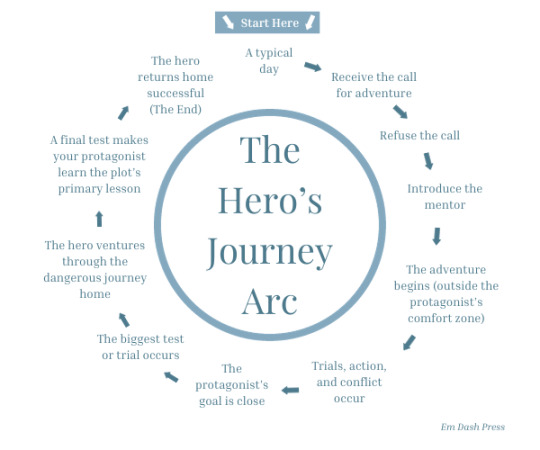
Part One: A Typical Day
Most stories start in this same place. Your reader needs to experience at least a bit of what your protagonist’s life is normally like. It establishes what matters to your protagonist, what they don’t like about their life, and the structural challenges they face.
Part Two: Receive the Call for Adventure
This part is Gandalf showing up on Bilbo’s doorstep. It’s the proposal of a grand adventure or the option to make a drastic change in the protagonist’s life.
The reader has seen what their life already looks like and if the protagonist is happy, so they understand what your hero has to potentially lose if things go wrong on their adventure.
Part Three: Refuse the Call
It’s very human to be scared of change. It’s also relatable to feel unequipped to handle a monumental responsibility. Hero archetypes often initially refuse their call, which can look like a few things:
Literally saying no to someone
Understanding their identity and running from it
Learning about their destined fate and rejecting it
Great heroes can also immediately accept the call. They don’t always have to refuse. It depends on your protagonist’s nature regarding change, adventure, and if they’re ready to overturn their life on a risky bet.
Part Four: Introduce the Mentor
Mentors help heroes prepare for their journey. This is the classic training montage, time spent in classes, or however your protagonist will learn the skills they need to achieve their journey’s goal.
Does your protagonist need a mentor? They may not if they already have most of the skills they’ll need. They can always learn new talents along their adventure as well.
Part Five: The Adventure Begins
The adventure is your overall plot. It might be a literal adventure, like exploring an unknown world. It could also be a new phase in your hero’s life, like going to college. Think of your hero’s adventure as the entirety of their upcoming experience that causes them to grow.
Part Six: Trials, Action, and Conflict Occur
These are your plot twists, your action scenes, and your interpersonal conflict. There’s no specific amount of each thing to include in your story. You only need the elements that further your hero along your plot or teach them more about your theme.
Example: Your hero’s adventure is a road trip across the country. They want to find the family car that got stolen a year ago, but your theme is the complicated nature of processing grief. Losing the family car caused a specific loss to occur within the family.
The events should help your hero recognize the grief, understand how they’ve been avoiding it, and learn how to process it. Anything that doesn’t build to that overarching theme won’t move the adventure along.
Part Seven: The Protagonist’s Goal Is Close
Your hero’s goal will eventually become within reach. It’s that moment when a character says the cliche, “XYZ is so close, I can almost taste it.”
Will your hero feel more motivated as their goal gets closer? Will they feel intimidated and try to run away? There are many ways this moment affects protagonists in the hero’s journey character arcs.
Part Eight: The Biggest Test or Trial Occurs
This is the part where your hero has no option left but to face their biggest test. It’s the final boss fight scene in a video game or the one-on-one fight in a movie between the protagonist and antagonist.
It can also mean your character faces the inward dilemma that’s the heart of your theme. Does it go well? It depends on how you want to end your story. Readers sometimes love a story that ends in defeat, especially if it sets up a sequel.
Your hero doesn’t have to end their story perfectly. If you think your theme will be more relatable or understandable through loss, go with your gut.
Part Nine: The Hero Ventures Through the Dangerous Journey Home
Sometimes this part isn’t necessary in stories, but it’s worth considering. After journeying far from home, your hero has won or lost their ultimate test. Now they have to return to their life as their changed self.
How will their adventure impact their relationships or way of life? They won’t be the same person they were on page one because you’ve had them experience an entire arc.
Part Ten: A Final Test Makes Your Protagonist Learn the Plot’s Primary Lesson
After returning home (or on the journey there), your hero may experience one more trial that drives your theme home. It’s not a required part of every story, but it’s another way to make your theme clear to the reader. It may also help you feel like you’ve tied up loose ends, if you feel like some remain.
Part Eleven: The Hero Returns Home Successful
Closing your story with your hero successfully back home brings your plot arc full circle. Heroes typically complete the arc in this way because they’re not stereotypically looking for a new place to live. They initially reject the call for adventure because they don’t want to leave.
However, your hero’s journey may include the dream or newly inspired desire to change their life. As long as they end up in a place where they are either happy or feel ready for new beginnings, you’ll have successfully included this part of the plot arc.
Examples of The Hero’s Journey Character Arc
The Odyssey
This classic example of a hero’s journey character arc includes every step outlined above. He leaves home for adventure (war), goes through numerous trials along the way there and the way home, then has a final test when he’s back home.
Pride and Prejudice
Elizabeth is the hero of Pride and Prejudice. When she receives the call for adventure (a marriage proposal) she rejects it. The novel’s events carry her on a seemingly unknown journey to the biggest test, which is when she realizes she’s in love with Mr. Darcy. A final test (Darcy’s second proposal) makes her confront her love and her concept of marriage.
The Hunger Games
Katniss’ hero’s journey character arc happens in each of the three books, plus the overall arc of the trilogy. She accepts the call to adventure (taking her sister’s place), experiences trials along the way (the Games), and faces a final test (saving Peeta along with herself by recognizing her true feelings for him and her power over the Games).
The story doesn’t end perfectly because two more books follow. However, it ends in a satisfying place for readers because every thread gets tied up (Katniss protecting her family, surviving, and learning to recognize and deal with her emotions).
Write Incredibly Heroic Characters
Writing a hero’s journey character arc might take some more planning than you’ve done in the past, but it isn’t impossible. Remember these steps to write an epic story with a hero your readers adore.
#writing heroes#hero archetype#heros journey#character arc#writeblr#writing advice#writing tips#writers of tumblr#creative writing#writing#writing community#writing inspiration#writing help#writing resources#character arcs#character creation#character development#writing characters#character building#story writing#creative writers#writers community
36 notes
·
View notes
Text
ok hi guys i have. genloss thoughts.
so we've seen a few different "archetypes" for characters, right? we have the hero (ranboo), the side characters (charlie and sneeg), the antagonists (the puzzler and demon charlie), the background characters (niki, austin, etc), and who i'm calling the crew (the ghouls & rats, the cameramen, and the drones). (hetch is his own thing but i will Get to him, also security and squiggles.)
all these archetypes are very distinct, there's not a lot of overlap between them (the only exceptions i could think of would be frank, who doesnt really count since he's not. yknow. alive. and rat-rae, who has speaking lines, but is still obviously crew.)
i'm thinking, these archetypes almost seem like... a life cycle. let me explain.
first, showfall finds a Hero. they need to be naive, blinded by fear and hope. so the Hero needs to be the first step. and there are three directions the Hero can go after that.
if the Hero is just... boring, uninteresting, going through the motions, they become Crew. the masks (or the goo, in the case of the ghouls) control them permanently.
if the Hero goes the way ranboo did, there are two options. either they die, and stay dead (or restart, becoming a Hero again), or they live and move on to the next step - becoming an Antagonist.
Antagonists have more freedom than Heroes (squiggles outright says they let the puzzler do whatever he wants), but they're still under showfall's control. the freedom is helpful because it makes them more interesting, but it also makes them unpredictable.
once an Antagonist has run their course, there's three options again. if they're too complacent, they become Crew. if they're too volitile or if showfall needs some drama or a Hero needs a win, they die. but if they prove to still be useful, they move on. they become a Background Character.
seems like a weird jump, right? but we saw it happen, with charlie. he died as demon slime, then reappeared as patient charlie.
also, i think this is the reason neither Antagonists lasted more than an episode. they need a lot of Background Characters, so turnover is quick.
by the time Background Characters arrive, they have developed personalities. or, more accurately, a single trait that showfall can monopolize on. charlie was slimy. niki was nice. austin was gay (a nice nod to the token gay trope, btw). and Background Characters switch up the formula a bit.
i think, by the time you get to this point, you aren't at risk of becoming Crew. or at least, it isnt likely (i'm thinking rat-rae was a BG Character who got turned into crew, which is why she can talk). no, instead, your two options are as follows:
you can stay a Background Character, "dying" and being reset every episode.
or, if you're a fan-favorite, you get upgraded to Side Character.
again, we saw this happen with charlie, and also with sneeg. i believe sneeg became a Side Character between episode 1 and 2, which is why he was allowed to see beyond the 4th wall. gotta have your characters be a little haunted, right? it's a horror show, after all.
and if you become a Side Character, there's not a lot of places to go. viewers will recognize you in different shows, so the question is - what does showfall do when a Side Character's show ends?
once again, they have two options. death or promotion.
and this time, the promotion is a little different.
so. hetch. a villian for sure, but he's in a weird position. he tells ranboo - and the viewers - during the final scene that he's just following orders. he wears his own mask, same as ranboo. but why? why have this weird, semi-canon, rebel traitor figure?
i think hetch made it to the final archetype. a subsection of Crew that's picked out for a special characteristic. anything that makes them truly compelling. i think the wire monster made it here, too (they were so consistently rebellious that showfall had to strip away all of their humanity, leaving them a mess of wire).
hetch became a Mascot.
hetch, the wire monster, and squiggles went through every step, proved their worth, and what did they get in return?
knowledge, but not freedom. never freedom.
and i think if we'd voted live, ranboo would have made it all the way as well.
#the kings decrees#genloss#genloss spoilers#gl!ranboo#genloss theory#long post#im going insane over here guys#you dont understand#it's a cycle... all of them are disposable... cogs in a machine... you dont understand!!!#inspired by watching charlie go from Silly Guy to Sillier Guy to Oh God I'm Going To Die Here#genloss archetype theory
58 notes
·
View notes
Text
#nanowrimo#writers#creative writing#writing#writing community#writers of tumblr#creative writers#writing inspiration#writeblr#writerblr#writing tips#writblr#writers corner#character archetypes#character development#archetypes#references for writers#resources for writers#let's write#writing tips and tricks#helping writers#help for writers#writing advice#learn to write#how to write#writers on tumblr#writers and poets
143 notes
·
View notes
Text
character tropes this character tropes that, you wanna know what my favorite trope is?
when the character that was mislead and brainwashed and terrorized into being the bad guy finally starts to realize that they’re wrong and tries to do the right thing, but dies right before they get out. all that pain and confusion and above all trying so hard to be good only for no one to recognize or remember them as anything other than their worst mistakes.
bonus points if the last thing they did or the thing that got them killed was the only reason that the heroes won, but no one knows.
10 notes
·
View notes